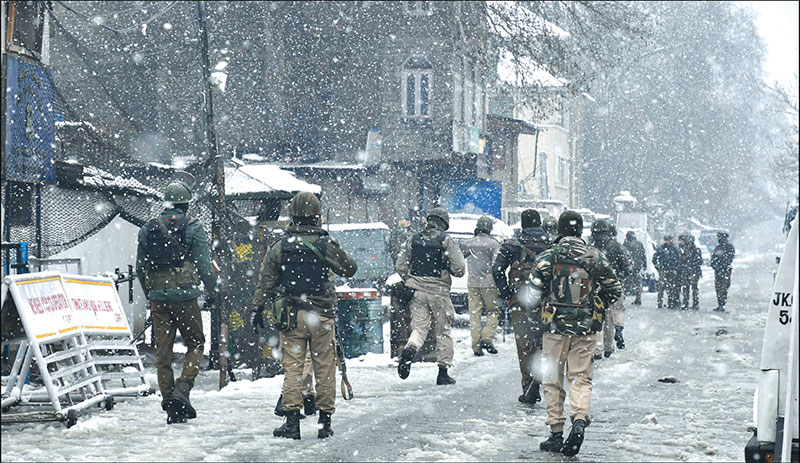This will come from Pakistan backed by China, and India should know whether it is militarily prepared
Pravin Sawhney
The Jammu and Kashmir government’s minister and the official spokesperson, Naeem Akhtar has recently raised two important issues concerning geopolitics and national defence whose implications impinge upon India’s strategic rise.
Speaking to a national newspaper, he said that China was assuming a bigger role in Kashmir which included ‘adopting’ the Jaish-e-Mohammad chief, Masood Azhar. Moreover, rebutting the Army Chief, General Bipin Rawat’s assessment that India faced possibility of the two-front war (with Pakistan and China), Akhtar said that ‘it is all one front. Pakistan and China aren’t separate.’
Geopolitically, China’s signalled its involvement in Kashmir in December 2010. It assumed the Big Brother role in May 2013, within months of the installation of the Chinese fifth generation leadership under President Xi Jinping in November 2012. Since this was before the Modi government’s anointment in May 2014, it was expected that India would read the tea leaves correctly. Unfortunately, this did not happen. Instead of a policy of ‘consolidation and cooperation’, Modi’s India, assuming itself to be China’s rival in Asia, has adopted a confrontationist policy towards Beijing. Worse, by refusing to talk with Pakistan and the stakeholders in Kashmir, it has made its state government partner, the PDP, headed by Mehbooba Mufti, redundant.

China dropped the political bombshell on the eve of its Premier Wen Jiabao’s India visit in December 2010 by saying that it had a mere 2,000 km long disputed border with India. Since India claims the disputed border to be 3,488 km long, the discrepancy of 1,488km should have rattled India. More so, since it was in Kashmir. By saying that it did not have a border with India in the western sector (Ladakh), China quietly endorsed Pakistan’s position that India was in occupation of Kashmir. Given this logic, Gilgit-Baltistan, by Chinese interpretation, was no longer disputed. This explains the People’s Liberation Army’s (PLA) presence in Gilgit-Baltistan beginning 2011. When confronted, China claimed its civilian engineers were working on the upgrade of the Karakoram Highway joining China’s Xinjiang province with Pakistan’s Gwadar port in Baluchistan.
Once the Xi dispensation assumed office determined to push the China Dream through the geopolitically aggressive Belt and Road Initiative (BRI), the announcement of the China-Pakistan Economic Corridor (CPEC) as the flagship of the BRI was made in May 2013 by Chinese Premier Li Keqiang. The BRI traverses the same path as the Karakoram Highway. Since the credibility of the BRI depends on the timely completion of the CPEC, Beijing’s high stakes in this project have spurred it to closely monitor the uncertainty at the two ends of the corridor. According to recent reports, Chinese interlocutors, with full knowledge of Pakistan, are in direct talks with the Baloch rebels to address their grievances. It is critical for China that Baloch separatists be quietened for the safety of the Gwadar port.
To handle the other end of what India calls the Pakistan Occupied Kashmir (PoK), China has adopted a two-pronged approach. On the one hand, it is wooing India to join the BRI by offering to discuss its sovereignty concerns; on the other hand, it is providing fulsome political, economic and military support to Pakistan to up the ante on Kashmir where India has adopted an uncompromising position, which unfortunately, it is unable to back with hard power (raw military component).
China has little intention to fight (politically and militarily) with India. This would both jeopardise Beijing’s claim of its peaceful strategic rise, and compel it to militarily join issues with the United States in the South China Sea dispute, for which it is not yet prepared. China, however, will ensure that Pakistan does not lose, either in Kashmir or Afghanistan (gateway of CPEC to Central Asia and West Asia). This explains China’s repeated blocking of India’s attempt to list Masood Azhar as a global terrorist under the United Nation Security Council’s sanctions committee.
Unlike the Baloch rebels, China would let Pakistan do the talking and fighting on Kashmir under its benediction. Given this, minister Akhtar is not accurate in saying that China is assuming a big role; it assumed the larger than life role in May 2013, which he and the Indian establishment appear unable to assess. Moreover, Akhtar is wrong in saying that China — which is hoping to displace the United States in the Asia-Pacific region — would ‘adopt’ terrorists like Masoor Azhar who are better minded by Pakistan’s Inter-Services intelligence.
You must be logged in to view this content.

